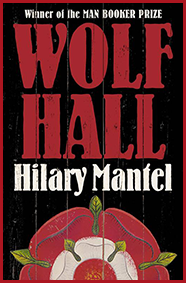WOLF HALL
Hilary Mantel (2009) ISBN 978-0-00-723030-4
Reviewing Wolf Hall presents problems. The first is simply: what more can be said? This is a Man Booker Prize winning author. In the front of the edition I own there are no less than five and a half pages of glowing review excerpts. That seems like publishing overkill to me, but then again I am not a publisher of great novels nor a marketer of them.
And Wolf Hall is a great novel. It is great on so many dimensions. And here is the second problem: what exactly to focus on? Should I examine the stylistic features of the novel? The rich emotional landscape? The close attention to psychology? All of these things glow through the pages of the work. I mention the style because it is remarkable that the approach is even readable, let alone enthralling. The whole book is written in present tense, third person, and the words are so closely written into the mind and thoughts of the protagonist, Thomas Cromwell, that he is often referred to simply as ‘he’ and many of his lines of dialogue are not partitioned out with quote marks at all. This on its own is not too unusual: it is a long-standing tradition of literary fiction to resort to near-abusive reliance on the simple male and female pronoun for a protagonist. There is good reasoning behind this; people hardly ever refer to themselves using their own name in their own thoughts… or at least, I don’t and having asked around a bit, other people don’t seem to either. It can break the narrative dream to insert too much Thomas did this and Thomas did that, though the flip-side is that leaving out the name entirely for pages at a time can cause the prose sink into a morass of the unintelligible. This does not happen here. The book remains clear and lucid throughout.
A second thing that strikes me as remarkable about this book is that it is about one of England’s most notorious periods of history (Henry VIII, his wives, the Crown’s ‘disagreement’ with the Church over divorce etc and so on), so that most people basically know what is going to happen with this Anne Boleyn woman. This should undermine the story entirely, and yet, somehow, it doesn’t really matter. There is such a deep wealth of emotional tension, hope, despair, and personal drama in Wolf Hall. It’s the journey that matters here and it is Thomas Cromwell’s journey in particular that matters above all.
Should you read Wolf Hall? Yes. Almost certainly. I initially picked up the book because it was described elsewhere as being very similar to George R.R. Martin’s rather grim fantasy series, Game of Thrones and I wondered whether that could possibly be true. The sense of intrigue and courtly drama do ring similar bells across the two series, but I think perhaps more importantly, the comparison is an indication of how accessible Hilary Mantel’s writing is, and that is (arguably) a rare thing among lauded literary novelists. This is a deeply literary work that is also broadly enjoyable, and that I think is what transposes books in general from the merely admirable to the great.
– Christopher Johnstone



How does Thomas More come off? If you have time, fish out a quote for me of Cromwell describing him.